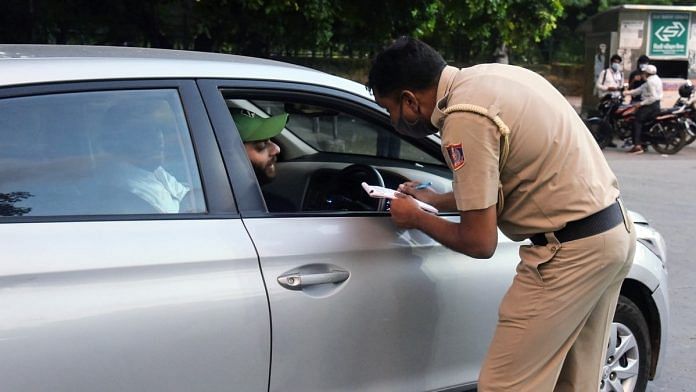New Delhi: A private vehicle, even if occupied by only one person, would constitute a “public place” in the context of the Covid pandemic, the Delhi High Court has ruled, upholding Delhi Disaster Management Authority’s (DDMA) regulations to prosecute those not wearing masks while travelling in a private car, either alone or in a group.
A single-judge bench of Justice Pratibha M. Singh pronounced the ruling on a batch of petitions that challenged DDMA’s April 2020 order as well as the regulations issued under the Epidemic Diseases Act (EDA).
All four petitioners were lawyers, who wanted their challans to be quashed.
“Wearing of masks cannot be an ego issue,” the judge said. “A mask is a suraksha kavach (protective shield) for preventing the spread of coronavirus.”
She advised the four advocates to follow the directives, given they are legally trained and, therefore, duty-bound to comply with the law.
“A vehicle which is moving across the city, even if occupied at a given point in time by one person, would be a public place owing to the immediate risk of exposure to the other persons under varying circumstances,” the judge said.
Two-fold challenge to DDMA’s order
The petitions had raised a two-fold challenge to the DDMA order and regulations — first that they were issued without any authority of law, and second, that a private car cannot be termed as a public space. Another point of contention made was that the regulations do not make it compulsory for an individual to wear a mask when travelling alone in a private vehicle.
Justice Singh dismissed all arguments advanced by the petitioners to hold that the order followed by regulations were tenable, since they were issued to ensure stricter compliance of various directives of the Centre and state government.
They (order and regulations) imposed penalties “by way of fines for a deterrent effect”, the judge said, elaborating on the objective of the government directives.
She took into account various guidelines, including that of the World Health Organization (WHO), and various international researches that support wearing of the mask for effective tackling the coronavirus. “The wearing of masks is necessary irrespective of whether a person is vaccinated or not,” the judge said
Also read: Driving alone? You still must be wearing mask, Delhi HC rules as India touches new Covid peak
‘Public place’
The moot question before the court was whether a private car with a single person can constitute a public place.
To determine that, Justice Singh weighed in the manner in which the virus spreads, which is through the droplets released from an individual either through breathing or sneezing.
“If a person is travelling in the car alone, the said status is not a permanent one. It is merely a temporary phase,” Justice Singh added.
The person may have visited a market, or workplace, or hospital or a busy street, prior to entering the car or vehicle, may stop at a traffic signal and roll down the window, there could be other occupants in the car prior to a said phase and post that phase, the judge said, as she examined the various circumstances under which an individual traveller in a car could be exposed to the virus and become a potential carrier.
The term ‘public place’, Justice Singh added, cannot be universally set in stone. It has been defined differently in various enactments, depending on the context, she said.
In the present cases, she said, the scope of the term has to be interpreted in the context of the pandemic.
“There are several possibilities in which, while sitting alone in the car, a traveller could be exposed to the outside world. Thus, it cannot be said that merely because the person is travelling alone in a car, the car would not be a public place,” the judge held.
Also read: Are Indians social distancing, following mask protocol as cases surge? This survey finds out
April regulations issued to ensure strict compliance
The petitioners had tried to differentiate between the April 2020 order and the regulations that followed thereafter. It was argued that while the April order specifically prescribed wearing of face masks in vehicles, the regulations only dealt with covering of faces in public places.
The petitioners contended that since a car occupied by one person would not be a public place, hence, a mask need not be worn.
But the court held this argument as untenable. The regulations, the court observed, was to ensure stricter compliance of the various directives of the Centre. “It is merely in continuance and to ensure stricter compliance of the earlier directives,” the judge said.
With respect to exercise of powers, the judge said the list of officers outlined in the regulations is broad and should be interpreted expansively and not restrictively. She quoted an old Supreme Court judgment to say the decision-making authority who has been conferred with statutory power to enforce the regulations can delegate tasks when there is an emergency.
(Edited by Neha Mahajan)
Also read: Thousands gather for Hola Mohalla festival in Punjab, give masks & social distancing a miss



